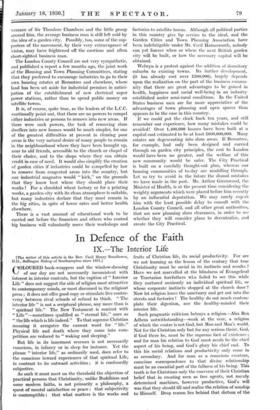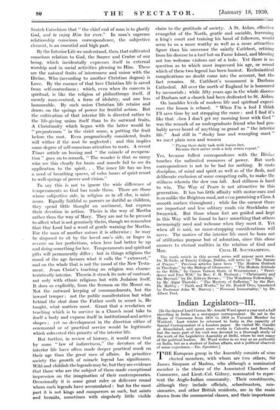In Defence of the Faith IX.—The Interior Life [The writer
of this article is the Rev. Cecil Henry Boutflower, D.D., Suffragan Bishop of Southampton since 1921.] COLOURED book-wrappers and the window-dressing of our day are not necessarily inconsistent with interest in interior contents, but the caption of " Interior Life " does not suggest the side of religion most attractive to contemporary minds, or most discussed in the religious press ; it does not offer good copy or stimulate live contro- versy between rival schools of refusal to think. " The interior life" is not a scriptural phrase, any more than is " spiritual life." The New Testament is content with " Life "—sometimes qualified as " eternal life," once as " the life which is life indeed." To that supreme Christian meaning it arrogates the current word for " life." Physical life and death where they come into com- petition are reduced to " waking and sleeping."
But life in its innermost recesses is not necessarily conscious, in infancy or in sleep for instance. Yet the phrase " interior life," as ordinarily used, does refer to the conscious inward experiences of that spiritual Life, in contrast to its outward activities ; it is confessedly subjective.
As such it -must meet on the threshold the objection of practical persons that Christianity, unlike Buddhism and some modern faiths, is not primarily a philosophy, a quest of mental satisfaction 'or peace : that subjectivity is -contemptible : that what matters' is the works and fruits of Christian life, its social productivity. For are we not learning as the lesson of the century that true Christianity must be social in its instincts and results Have we not marvelled at the blindness of Evangelical or Tractarian forefathers who failed to see this while they nurtured anxiously an individual spiritual life, or whose corporate instincts stopped at the church door ? Now let religion leave the sanctuary and get out into the streets and factories ! The healthy do not much contem- plate their digestion, nor the healthy-minded their interior life.
Such pragmatic criticism betrays a religion—Abu Ben Adhem notwithstanding—weak at the core, a religion of which the centre is not God, but Man and Man's world. Not for the Christian only but for any serious theist, God, if God there be, must be the supreme fact of existence ; and for man his relation to God must needs be the chief aspect of his being, and God's glory his chief end. To this his social relations and productivity only come in as secondary. And for man as a conscious creature, conscious correspondence to that divine relationship Must be an essential part of the fullness of his being. This truth is for Christians only the converse of their Christian belief that in 'creating men as free agents, not merely determined machines, 'however productive, God's will was that they should fill and realize the relation of sonship to' Himself. Deep reason- lies behind that dictum of the Scotch Catechism that " the chief end of man is to glorify God, and to enjoy. Him for ever." In man's supreme relationship conscious correspondence, the subjective clement, is an essential and high part.
By the Interior Life we understand, then, that cultivated conscious relation to God, the Source and Centre of our being, which incidentally expresses itself in external worship and in social activities pleasing to Him. These are the natural fruits of intercourse and union with the Divine, Who (according to another Christian dogma) is Love. By the essence of that love Christian life is saved from self-centredness ; which, even when its concern is spiritual, is like the religion of philanthropy itself, if merely man-centred, a form of idolatry, and one less honourable. By such union Christian life retains and draws on the springs of power for fruitful action. But the cultivation of that interior life is directed rather to the life-giving union itself than to its outward fruits. A Christianity which began with the latter would be " preposterous " in the strict sense, a putting the fruit before the root. Even pragmatically considered, fruits will wither if the root be neglected ; and this implies some degree of self-conscious attention to roots. A recent Times article on boxing and " the miracle of recupera- tion " goes on to remark, " The wonder is that so many who see this clearly for brain and muscle fail to see its application to the spirit. . . The inner life has no less a need of breathing spaces, of calm hours of quiet resort to well-springs of power and vision."
To say this is not to ignore the wide difference of temperaments as God has made them. There are those whose subjective side, in religion as in all else, is mini- mum. Equally faithful as parents or dutiful as children, they spend little thought on sentiment, but express their devotion in action. Theirs is the way of Martha rather than the way of Mary. They are not to be pressed to affect what is not genuinely theirs, though we remember that Our Lord had a word of gentle warning for Martha. For the man of another nature it is otherwise ; he may be disposed to sit by the loved one's side, or linger in reverie on her perfections, when love had better be up and doing something for her. Temperaments and spiritual gifts will permanently differ ; but in things religious the mood of the age favours what it calls the " extrovert," and on the whole that is not the mood of the New Testa- ment. Jesus Christ's teaching on religion was charac- teristically interior. Therein it struck its note of contrast, not only with ethnic religions but with Judaism itself. It does so explicitly, from the Sermon on the Mount on. Not the outward keeping of commandments, but the inward temper : not the public manifestation but what behind the shut door the Father seeth in secret is, He taught, what matters most. Grant that a revelation or teaching which is to survive in a Church must take to itself a body and express itself in institutional and active shapes ; yet no development in the direction either of ceremonial or of practical service would be legitimate which subverted this priority of the interior life.
But further, in review of history, it would seem that by some '" law of indirectness," the devotees of the interior life have often made deeper practical mark on their age than the great men of affairs. In primitive society the growth of miracle legend has significance. Wild and childish the legends may be, but they are evidence that those who are the subject of them made exceptional impression on the imagination of their contemporaries. Occasionally it is some great ruler or deliverer round whom such legends have accumulated : but for the most part it is not kings and conquerors as such, but saints and hermits, sometimes with singularly little visible claim to the gratitude of society. A St. Aidan, effective evangelist of the North, gentle and sociable, leavening a king's court and training his band of followers, would seem to us a more worthy as well as a more attractive figure than his successor the saintly Cuthbert, retiring from his diocese to a turf but on Fame Island, and blessing not too welcome visitors out of a hole. Yet there is no question as to which most impressed his age, or round which of these two legend has been busiest. Ecclesiastical complications no doubt come into the account, but the fact remains. St. Cuthbert's monument is Durham Cathedral. All over the north of England he is honoured by memorials ; while fifty years ago in the whole diocese of Durham not a church had been dedicated to St. Aidan.
On humbler levels of modern life and spiritual experi- ence the lesson is echoed. " When I'm a fool I think I'll save time by not stropping the razor : and I find it's like that .Then I don't get my morning hour with God " was the remark of an undergraduate friend who had pro- bably never heard of anything so grand as " the interior life." And still in " dusky lane and wrangling mart " we meet plain men and women
" Plying their daily task with busier feet, Because their secret souls a holy strain repeat."
Yes, because fullest correspondence with the Divine touches the unlimited resources of power. But such correspondence is not to be had for nothing. It costs discipline, of mind and spirit as well as of the flesh, and deliberate exclusion of some competing calls, to make the stillness wherein the dew can fall. And stillness is hard to win. The Way of Peace is not attractive to this generation. It has too little affinity with motor-cars and is so unlike the Brighton road, not even promising a Class A smooth surface throughout ; while for the earnest there are important and less solitary roads via Stockholm or Swanwick. But those whose feet are guided and kept in this Way will be found to have something that others increasingly need and welcome when they meet it. Yet when all is said, no razor-stropping considerations will serve. The motive of the interior life must be born not of utilitarian purpose but of adoration, since this alone answers to eternal realities in the relation of God and The tenth article in this second series will appear next week. Dr. McNeile, of Trinity College, Dublin, will write on The Nature of Prayer." Previous articles have been " The Modern Outlook in Theology," by the Bishop of Gloucester ; " The Modern Attitude to the Bible," by Canon Vernon Storr, of Westminster ; " Provi- dence and Free Will," by Rev. F. H. Brabant ; " Christianity and the Beyond," by Dr. Edwyn Bevan ; " The Wondrous Fellowship," by Mr. Algar Thorold ; " The Mystery of Suffering," by the Rev. Dr. Maltby ; " Faith and Works," by Dr. Rudolf Otto, translated by Professor John W. Harvey ; " Personal Immortality," by Dr. Albert Peel.







































 Previous page
Previous page